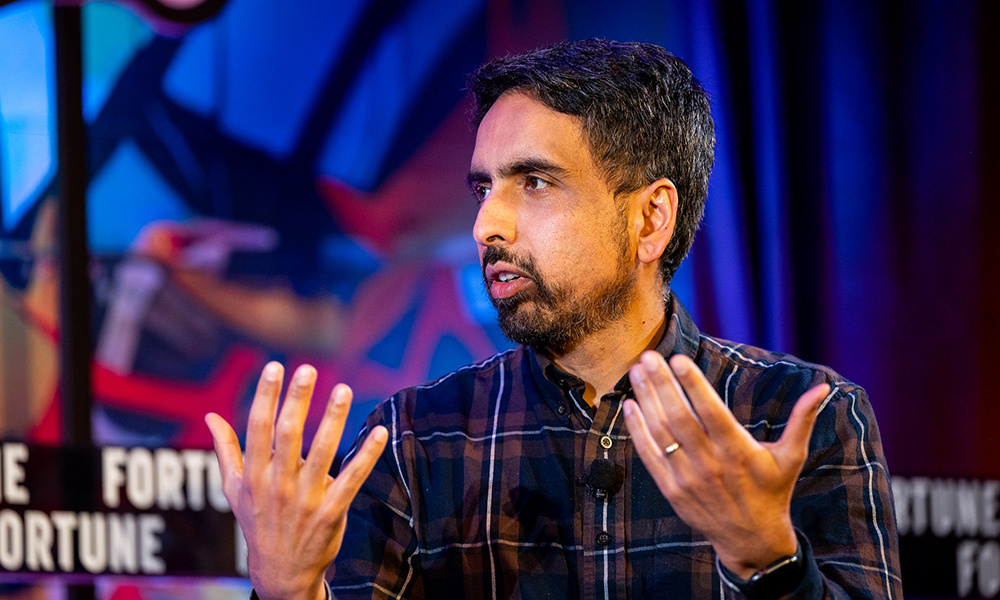
周一,在旧金山举行的《财富》人工智能头脑风暴大会上,可汗在台上接受采访时表示:“在我们使用GPT-4技术的第一个周末,我们就觉得‘这可能会被用来作弊’。”2023年3月,可汗学院发布了基于GPT的人工智能助教Khanmigo,可汗已经安装了多重防护措施,以防止学生将其用作作弊工具。
可汗说:“我们设置了很多护栏。”他介绍说,教师可以控制学生向机器人询问哪些信息,自动监控功能也可以标记对该工具的不当使用。
可汗说,虽然互联网长期以来一直是作弊的资源(“在ChatGPT和生成式人工智能出现之前,互联网上有很多网站,你只需支付5美元,他们就会在肯尼亚雇枪手帮你写论文”),但人工智能的力量意味着学习和教学的概念本身也将不断发展。
例如,学生论文很可能因人工智能而发生重大变化,机器人将成为学生和老师的写作“助教”。“Khanmigo会告诉学生们,‘嘿,让我们一起完成这篇论文吧。我不会替你写,但我是你的助教。我会给你提供一些反馈。’”
可汗说,不必让学生简单地提交一篇论文,而是让人工智能机器人将论文提交给老师,同时还可以提供学生和机器人撰写论文陈述的过程、花费的时间、甚至班上有多少其他学生在写作过程中遇到类似问题的信息。
可汗说:“论文永远具有真正的价值,但也可以是模拟、对话或访谈——[任何手段]都可以确保学生使用的信息是准确的。”
2006年,可汗创办了可汗学院,为他的表弟远程教授数学。从那时起,该公司通过互联网免费为数亿学生提供了从三角学到金融知识的教育课程。去年,该公司与OpenAI的GPT-4合作推出了一款名为Khanmigo的人工智能助教。
他的言论不仅对电子学习者有重要意义,而且对美国公立学校的家长和孩子来说亦是如此:可汗正在与各大学区洽谈,希望让“数十万甚至数百万”儿童能够使用Khanmigo进行日常学习。
可汗说:“我们对[Khanmigo]的研究越深入,就越意识到,我们可以做的事情甚至可以超越传统的家教。”(财富中文网)
译者:中慧言-王芳
周一,在旧金山举行的《财富》人工智能头脑风暴大会上,可汗在台上接受采访时表示:“在我们使用GPT-4技术的第一个周末,我们就觉得‘这可能会被用来作弊’。”2023年3月,可汗学院发布了基于GPT的人工智能助教Khanmigo,可汗已经安装了多重防护措施,以防止学生将其用作作弊工具。
可汗说:“我们设置了很多护栏。”他介绍说,教师可以控制学生向机器人询问哪些信息,自动监控功能也可以标记对该工具的不当使用。
可汗说,虽然互联网长期以来一直是作弊的资源(“在ChatGPT和生成式人工智能出现之前,互联网上有很多网站,你只需支付5美元,他们就会在肯尼亚雇枪手帮你写论文”),但人工智能的力量意味着学习和教学的概念本身也将不断发展。
例如,学生论文很可能因人工智能而发生重大变化,机器人将成为学生和老师的写作“助教”。“Khanmigo会告诉学生们,‘嘿,让我们一起完成这篇论文吧。我不会替你写,但我是你的助教。我会给你提供一些反馈。’”
可汗说,不必让学生简单地提交一篇论文,而是让人工智能机器人将论文提交给老师,同时还可以提供学生和机器人撰写论文陈述的过程、花费的时间、甚至班上有多少其他学生在写作过程中遇到类似问题的信息。
可汗说:“论文永远具有真正的价值,但也可以是模拟、对话或访谈——[任何手段]都可以确保学生使用的信息是准确的。”
2006年,可汗创办了可汗学院,为他的表弟远程教授数学。从那时起,该公司通过互联网免费为数亿学生提供了从三角学到金融知识的教育课程。去年,该公司与OpenAI的GPT-4合作推出了一款名为Khanmigo的人工智能助教。
他的言论不仅对电子学习者有重要意义,而且对美国公立学校的家长和孩子来说亦是如此:可汗正在与各大学区洽谈,希望让“数十万甚至数百万”儿童能够使用Khanmigo进行日常学习。
可汗说:“我们对[Khanmigo]的研究越深入,就越意识到,我们可以做的事情甚至可以超越传统的家教。”(财富中文网)
译者:中慧言-王芳
“That first weekend we had access, we were like ‘This could be used to cheat,'” Khan said Monday in an onstage interview at Fortune’s Brainstorm AI conference in San Francisco. By the time Khan Academy released its GPT-powered tutor Khanmigo, in March 2023, Khan had installed multiple safeguards to prevent students from using it as a cheat tool.
“There’s a lot of guardrails there,” Khan said, describing features for teachers to control what information students can ask the bot, as well as automated monitoring features to flag inappropriate uses of the tool.
But while Khan said the internet has long been a resource for cheating (“Before ChatGPT and generative AI, there were plenty of websites on the internet where you could pay $5 and they’ll hire someone in Kenya to write your papers for you”), the power of AI means that the concept of learning and teaching itself will evolve.
The student essay, for example, is likely to change significantly as a result of AI, with bots serving as a writing “coach” for students and teachers. “Khanmigo will then tell the students, ‘Hey, let’s work on this paper together. I’m not going to do it for you, but I’m gonna be your coach. I’m going to give you feedback.'”
Instead of a student simply submitting an essay, Khan said, an AI bot could deliver the essay to the teacher, along with information about the process the student and the bot went through to craft a thesis statement, how long it took, and even how many other students in the class struggled with similar parts of the writing process.
“Essays will always have real value,” Khan said, “but it could be a simulation, conversation, or interview—[any means] to make sure the information the students are using is accurate.”
Khan started Khan Academy in 2006 to teach math remotely to his cousin. Since then, the company has educated hundreds of millions of students at no cost via the internet in subjects that range from trigonometry to financial literacy. And last year, the company partnered with OpenAI’s GPT-4 to launch an AI tutor called Khanmigo.
His words should hold significant weight, not just for e-learners, but for parents and children involved in American public schools: Khan is in talks with school districts that would give “hundreds of thousands, if not millions” of children access to Khanmigo for day-to-day learning.
“The more we’ve worked on [Khanmigo], we realized we can do things that even transcend the traditional tutor,” says Khan.






